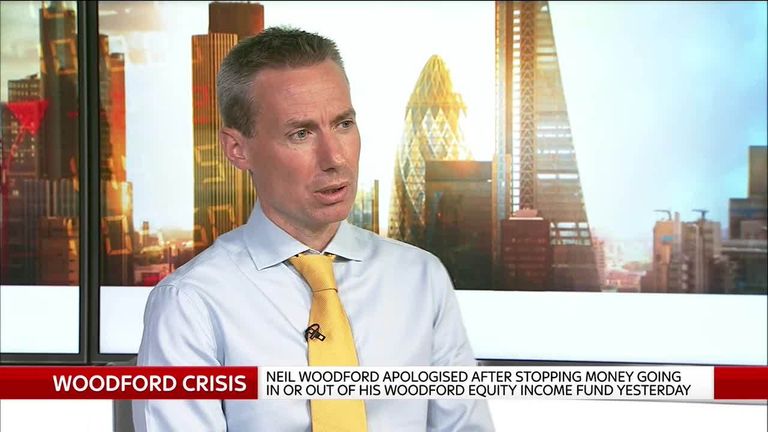Neil Woodford's spectacular downfall is a disaster for financial services sector
Sky's Ian King says the fund management industry faces greater curbs as Neil Woodford's reputation lies in tatters.
Tuesday 15 October 2019 17:41, UK
The business world is full of stories about highs and lows, successes and failures, triumphs and disasters.
Rarely, though, can there have been such a spectacular fall from grace as that suffered by Neil Woodford.
It came as a significant shock when, exactly six years ago today, Mr Woodford announced he was leaving Invesco Perpetual after more than a quarter of a century to set up on his own.
Mr Woodford was, at the time, the UK's most lionised fund manager and, overseeing funds that contained £33bn worth of assets, the country's biggest individual manager of money.
The news was seen as a hammer blow to Invesco Perpetual, based in Henley-on-Thames, as Mr Woodford accounted for almost half of its funds under management. Shares of the company fell by 6% on the news.
And with good reason: on the day Mr Woodford resigned, the Invesco Perpetual High Income fund he was running was showing a 2,192% rise since its launch in 1988, compared with a rise of just 925% in the FTSE All Share index during the same period.
Those fears were soon justified. Within six weeks, investors had yanked some £1.4bn from the funds Mr Woodford had run, most of which would find its way to his new business.
At the time, for those who cared to look, there were some ominous portents in the stock market of what was to play out this year when things soured for the former star.
Mr Woodford's habit of amassing large positions in companies meant that, when some investors cashed in their chips, Invesco Perpetual was obliged to sell shares in some of them in significant volumes.
Mr Woodford had, for example, accumulated an 18.2% stake in Assura, a healthcare property investor, which Invesco Perpetual was obliged to offload in its entirety. Others where Invesco Perpetual was obliged to sell down its stake heavily included Capita, the outsourcing group and Provident Financial, the consumer credit provider.
Market-makers - the professionals who quote two-way prices in stocks - were wise to it quickly. Anything with a so-called "Woodford overhang" was marked down - making Invesco Perpetual's task all the harder.
It should have been a warning. Precisely the same thing happened this year when Mr Woodford, now at his own Woodford Investment Management, was obliged to sell down major shareholdings in order to meet redemption requests.
That was not the only warning back in late 2013.
If Neil Woodford was Britain's most famous fund manager, then unquestionably the second most famous in the United States - after Warren Buffett - was Bill Gross of Pacific Investment Management Co (Pimco), whose expertise in managing fixed-income assets earned him the nickname 'the Bond King' and made him a regular on the US business television networks.
The $244bn (£191bn) Pimco Total Return Fund, the biggest single bond fund in the world, turned in a loss of 1.9% for the year - its worst performance in 21 years. It was a salutary reminder that even the most sure-footed of "star" fund managers could have an off-year. Mr Gross would leave Pimco within months.
For a while, all went well, with Mr Woodford in April 2014 securing a mandate from St James's Place, the wealth management firm, to run £3.7bn worth of money that he had previously managed at Invesco Perpetual.
By then, some £5bn had been drained from the latter, most of it finding its way to the Woodfood Equity Income Fund when it launched in June 2014.
Mr Woodford himself, meanwhile, broke the habit of a lifetime and deigned to speak to the press.
As Citywire Wealth Manager, the respected financial services website, noted at the time: "The joke was that you'd have more chance of getting an interview with the Queen than Neil when [he was] at Invesco Perpetual... his very existence sometimes felt like an urban legend.
"Now we're spoilt. Far from being invisible, Woodford is now omnipresent."
Mr Woodford raised a record £1.6bn from investors at launch. That, along with the St James's Place mandate, meant he was running more than £5bn within a month of starting. The flagship Woodford Equity Income fund surged to a peak of £10.2bn in May 2017.
Then things soured, following a string of poor investment decisions, culminating in a decision in June to "gate" the funds to stop investors taking their money out.
When St James's Place withdrew its £3.5m investment mandate, a few days later, many in the City felt this would surely be the end.
This was confirmed when, at 4pm on Monday afternoon, Mr Woodford was told he had been sacked as manager of the Woodford Equity Income Fund.
That will now be liquidated and the money returned to investors - most of whom will be left nursing heavy losses. They are at least 20% down since trading in the fund was frozen in June.
The likely end of Mr Woodford's career as a fund manager, after nearly three decades, will have been cushioned by the fortune he has accumulated in that time.
He and his chief executive, Craig Newman, shared a £36.5m dividend for the year to the end of March 2018, on top of pay-outs of £12.7m for 2017 and £11.1m for 2016. His investors should be so lucky.
For the wider financial services sector, however, this is little short of a disaster.
It is bound to undermine confidence in the entire fund management industry. Hargreaves Lansdown, the stockbroker and wealth management platform provider which enjoyed a close relationship with Mr Woodford, has suffered particular reputational damage.
Just under 300,000 of its customers have direct or indirect exposure to the Woodford Equity Income Fund.
The row has also angered one of HL's co-founders, Peter Hargreaves, who told the Sunday Times earlier this month of his fury with Mr Woodford and with HL itself for "stuffing" its clients "into this horrible Woodford fund".
But the fallout will go further than that. The Financial Conduct Authority, whose chief executive, Andrew Bailey, is a contender to be the next governor of the Bank of England, is facing questions from MPs for its oversight of Woodford Investment Management.
And, at the very least, the affair is likely to result in some regulatory changes.
The hope must be that this scandal does not, ultimately, dissuade people from investing in the stock market or in vehicles that invest in the stock market.
Most Britons, unless they are lucky enough to have a gold-plated pension of the kind now only available in the public sector, need exposure to equities as part of their long-term or retirement savings.
Those tempted to whip their long-term savings into deposit accounts or premium bonds on the back of this saga will be condemning themselves to penury in the future if they do.
That fate may already be looming for the thousands of investors now trapped in Mr Woodford's fund.
Their biggest mistake was to forget the boilerplate regulatory blurb that appears at the end of all promotional material for investments: "Past performance is not a guide to future performance."







